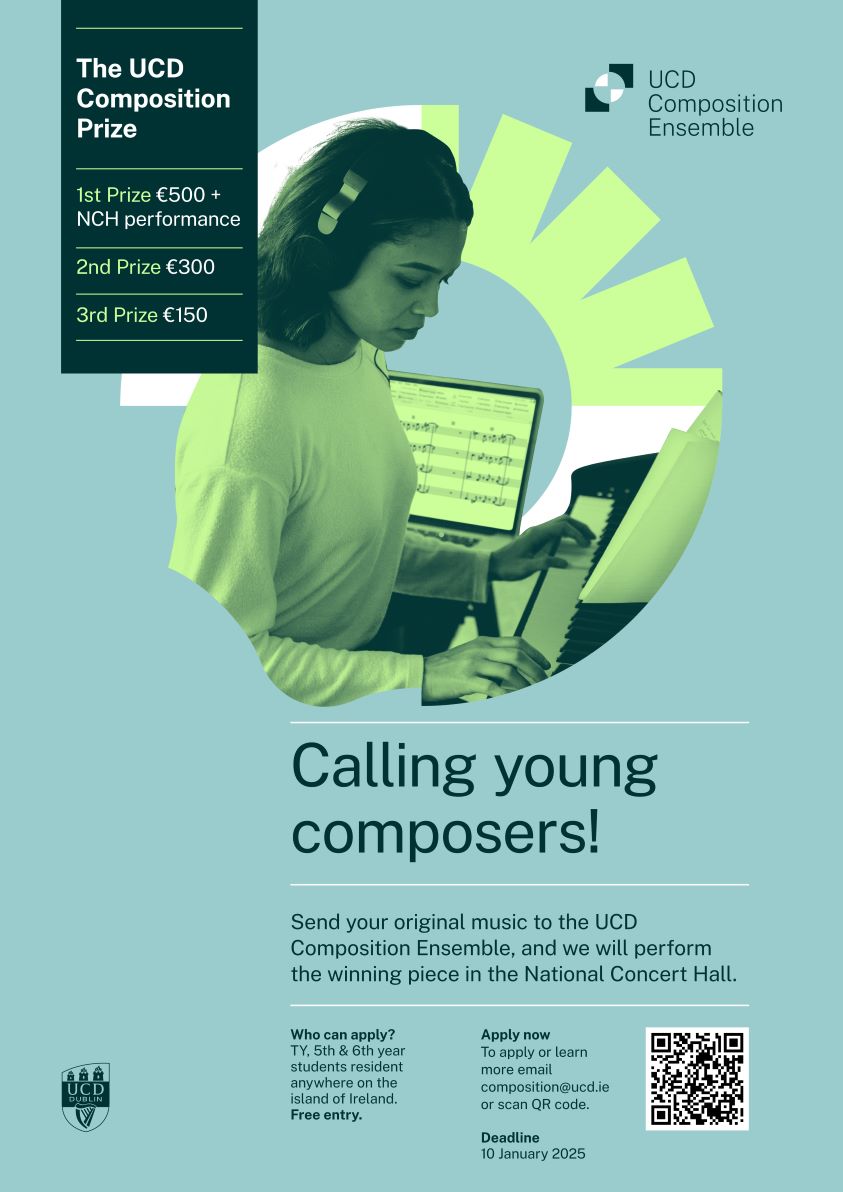The UCD Composition Prize
3 September 2024

The 2024 UCD Composition Prize is now accepting submissions!
Young composers have the exciting opportunity to hear their original work performed by the UCD Composition Ensemble at the renowned National Concert Hall in April 2025.
How To Apply
This competition is free and open to students from Transition Year to Leaving Cert/A-Levels who are resident anywhere on the island of Ireland.
Compose for any combination of 1-4 instruments or voices (electronic parts are also possible).
Our ensemble line-up is highly flexible, so almost any combination of instruments can be accommodated. If in doubt, you can focus on the more commonly available instruments (e.g. voice, guitar, piano, bass, violin, viola, flute, clarinet, etc. etc., although many others are also possible), or if you have any specific queries, please email (opens in a new window)composition@ucd.ie.
You can write in any style - what we are looking for are original and creative voices! Submissions will be judged on the originality and coherence of the musical idea, how well the music is written for the chosen instruments, and how well-presented the score is.
Submit your original composition as a pdf, with an accompanying recording or MIDI realisation if possible. (You can create a MIDI file using notation software such as Sibelius or Musescore.)
Include your name, contact details, and the name of your school.
The winning piece will be performed by the UCD Composition Ensemble in Ireland's National Concert Hall on Friday 25th April 2025.
Email your entries to (opens in a new window)composition@ucd.ie
Deadline for submissions: January 10th 2025
Frequently Asked Questions
How long should my composition be?
Entries are strongly preferred to be no less than 2 minutes and no more than 10 minutes in duration. A typical entry would be anywhere between 2-5 minutes.
Does the music have to be notated?
Yes, in some way. Notation can come in many forms, but bear in mind that the ensemble will begin to rehearse the winning piece as soon as it is selected. Therefore the notation, in whatever form that may take, must be complete in all its details when the work is submitted.
How will the entries be judged?
Entries will be graded in two main categories:
i) Compositional Skill and Creativity e.g. the originality and strength of your musical ideas, and how well you brought them all together.
ii) Technical Competence and Understanding e.g. how well you have written for your chosen instruments, how well-presented and clearly notated is the work.
Additional consideration will also be given to the work's feasibility e.g. a 3-minute work for piano and violin is far more feasible than a 10-minute work for four tubas!
Can I perform in the concert?
Generally no, in this competition, you are writing for an ensemble, and your ability to communicate your ideas with other musicians is a part of what is being assessed here. However, if your direct involvement is a crucial part of the work (e.g. if you are using specialist instruments, skills, or software, etc.), you can specify that in your submission.
Can I enter an electronic work?
Electronic elements are welcome, but remember, we are a performing ensemble, so there must be at least one instrumental/vocal component as well. Solely electronic works are not accepted.
Can I enter a pop/rock/folk/etc song that I have written and recorded myself?
Technically yes, but it isn't advised, for two reasons: Firstly, as mentioned, you won't be invited to perform your own song, so any work you submit has to be notated in such a way that other performers can easily reproduce it. And secondly, the main criteria for the judges is creativity and originality of musical ideas, so a singer strumming regular guitar chords, for example, is not likely to score high in this particular competition. Having said that, there is no fixed definition of what a song is, so if you have an exceptionally new idea, if you happen to be dramatically re-inventing the concept of what a song can be, and how a guitar or a piano can be played, then you may just catch the judges' attention!
Best of Luck!